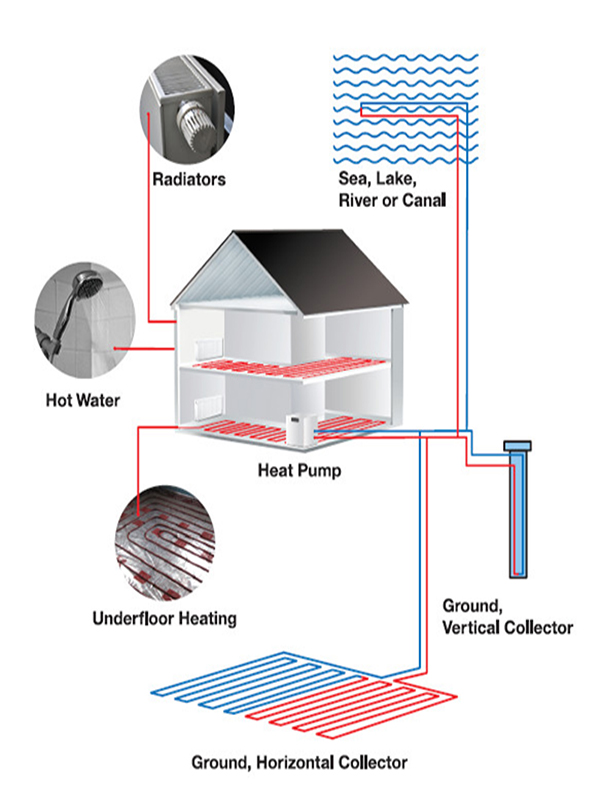How does a GSHP work?
A Ground Source Heat Pump transfers heat from the ground into buildings.
Radiation from the sun heats the earth. The earth then stores the heat and maintains, just two metres or so down, a temperature of around 10°C even throughout the winter. A ground source heat pump uses a ground heat exchange loop to tap into this constantly replenished heat store to heat buildings and provide hot water. The technology used is the same as that used in refrigerators.
Just as a fridge extracts heat from the food and transfers it into the kitchen, so a ground source heat pump extracts heat from the earth and transfers it into a building.
How efficient are Ground Source Heat Pumps?
For every unit of electricity used by the heat pump, three to four units of heat are captured and transferred. In effect this means a well installed Ground Source Heat Pump can be 300-400% efficient in terms of its use of electricity. At this efficiency level there will be 70% lower carbon dioxide emissions than for a gas boiler heating system. If the electricity is provided by renewable energy, then carbon emissions can be reduced to zero.
The Advantages of Ground Source Heat Pumps
Ground Source Heat Pumps save money. Heat pumps are much cheaper to run than direct electric heating systems. GSHPs are cheaper to run than oil boilers, burning coal, LPG or gas. This is before taking into account the receipt of RHI, which amounts to over £3,000 a year for an average four bedroom detached house – larger than for any other technology under the RHI.
Because heat pumps can be fully automated they demand much less work than biomass boilers.
Heat pumps save space. There are no fuel storage requirements.
No need to managed fuel deliveries. No risk of fuel being stolen.
Heat pumps are safe. There is no combustion involved and no emission of potentially dangerous gases. No flues are required.
GSHPs require less maintenance than combustion based heating systems. They also have a longer life than combustion boilers. The ground heat exchanger element of a ground source heat pump installation has a design life of over 100 years.
Heat pumps save carbon emissions. Unlike burning oil, gas, LPG or biomass, a heat pump produces no carbon emissions on site (and no carbon emissions at all, if a renewable source of electricity is used to power them).
GSHPs are safe, silent, unobtrusive and out-of-sight: they require no planning permission.
Heat pumps can also provide cooling in summer, as well as heating in winter.
A well designed ground source heat pump system is likely to increase the sale value of your property.
Post time: Jul-14-2022


